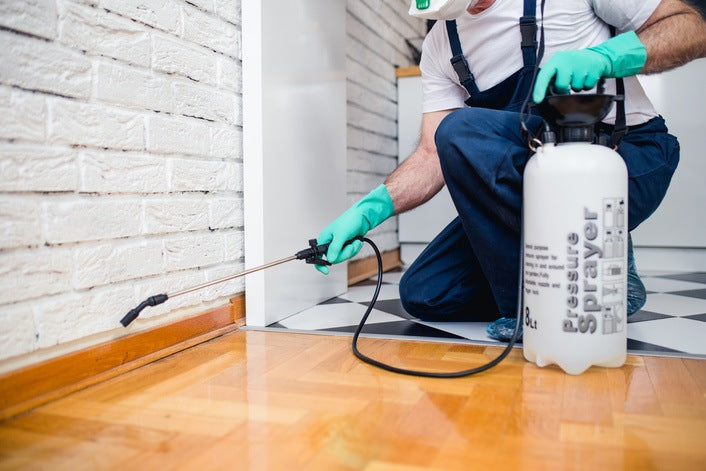Discovering the Different Kinds of Pest Control Techniques and Their Applications
Pest control is an essential element of maintaining a safe and healthy environment, whether it remain in property, commercial, or farming setups. Numerous methods have been developed and improved for many years to effectively manage and reduce insect problems. From chemical approaches that target certain bugs to biological methods that harness natural predators, the realm of bug control is vast and varied. Comprehending the various kinds of parasite control techniques and their applications is crucial for executing one of the most sustainable and appropriate services. Allow's discover the ins and outs of these methods and how they can be successfully utilized to attend to pest-related difficulties.
Chemical Insect Control Techniques
Chemical parasite control techniques are commonly made use of in agriculture and parasite administration to efficiently remove or regulate pest infestations. These techniques entail using chemical materials, such as pesticides, chemicals, and herbicides, to minimize or eliminate insect populaces that posture a threat to crops, livestock, or human wellness. Pesticides, for example, target certain bugs like weeds, rodents, or insects, interrupting their life process or triggering straight injury upon call. Herbicides are specifically created to manage undesirable plants that takes on plants for resources and nutrients. Insecticides, on the various other hand, are made use of to combat insect parasites that can harm plants and send conditions.
While chemical parasite control methods can be highly efficient in taking care of pest populaces, they also elevate problems regarding possible environmental and health threats. It is important to comply with safety and security standards, use integrated pest administration strategies, and consider alternate techniques to lessen the negative effects of chemical bug control techniques.
Biological Insect Control Techniques
 Biological insect control techniques utilize living organisms to take care of and decrease pest populations in a sustainable and environmentally friendly fashion. This technique includes introducing all-natural killers, bloodsuckers, or pathogens to regulate parasites without the requirement for artificial chemicals. One usual technique is the release of ladybugs to battle aphids in yards, as ladybugs are natural killers of these destructive parasites. One more example is making use of Bacillus thuringiensis (Bt), a germs that generates contaminants deadly to certain insect larvae, to regulate mosquitoes and caterpillars.
Biological insect control techniques utilize living organisms to take care of and decrease pest populations in a sustainable and environmentally friendly fashion. This technique includes introducing all-natural killers, bloodsuckers, or pathogens to regulate parasites without the requirement for artificial chemicals. One usual technique is the release of ladybugs to battle aphids in yards, as ladybugs are natural killers of these destructive parasites. One more example is making use of Bacillus thuringiensis (Bt), a germs that generates contaminants deadly to certain insect larvae, to regulate mosquitoes and caterpillars. 
Biological pest control methods supply numerous benefits over chemical approaches. Overall, organic bug control techniques present a effective and natural option to standard chemical therapies, promoting a balanced ecological community and healthier environments.
Physical Pest Control Approaches
Making use of physical methods to regulate insects entails making use of mechanical or non-chemical methods to manage and mitigate parasite invasions efficiently. These methods count on physical obstacles, traps, and various other techniques to hinder and get rid of insects without the use of harmful chemicals. One typical physical pest control technique is the installation of internet, fencings, or screens to obstruct insects from getting in specific locations. This method is especially efficient in shutting out pests and small animals from yards or structures.
An additional physical approach is making use of traps, such as snap traps for you can check here rodents or scent catches for pests. These catches aim to capture insects without presenting any type of risk to humans or the environment. Furthermore, physical control techniques can include techniques like handpicking parasites off plants, using vacuum devices to remove insects, or employing warmth treatments to remove bed insects and various other bugs in plagued areas.
Integrated Pest Management Strategies
Executing a holistic approach to pest monitoring, Integrated Bug Administration (IPM) strategies aim to incorporate various reliable strategies to regulate and stop parasite problems while decreasing ecological effect and making sure sustainable parasite control methods. IPM involves the integration of multiple control approaches such as biological control, cultural techniques, mechanical control, and the cautious use of chemicals.

Additionally, IPM highlights the relevance of monitoring and analyzing pest populations to identify one of the most ideal control strategies. By executing IPM strategies, insect control initiatives come to browse around here be more targeted and efficient, decreasing the dangers related to excessive pesticide use and advertising lasting insect management options.
All-natural and Organic Bug Control Options

One prominent natural pest control approach is neem oil, acquired from the seeds of the neem tree, which works as a repellent and disrupts the growth and development of insects. Diatomaceous earth, a natural silica-based powder, is another effective natural bug control choice that functions by dehydrating insects upon contact. By including natural and natural parasite control alternatives right into bug monitoring techniques, people can effectively regulate parasites while minimizing harm to the setting and promoting lasting practices.
Verdict
In conclusion, visit homepage different parasite control strategies such as chemical, biological, physical, incorporated bug monitoring, and all-natural options are available for successfully taking care of insect invasions. Each technique has its very own benefits and applications relying on the kind of parasite and the atmosphere. By recognizing the various kinds of parasite control strategies and their applications, people can make enlightened choices on the most appropriate strategy to manage bugs and shield their residential property.
Chemical parasite control strategies are commonly utilized in agriculture and bug monitoring to effectively eradicate or control pest problems - Orem Pest Control. All-natural bug control methods include using organic control representatives, such as killers or parasites, to manage pest populaces. By integrating natural and natural insect control alternatives right into parasite monitoring methods, individuals can effectively regulate bugs while lessening injury to the atmosphere and promoting lasting methods
In conclusion, numerous bug control methods such as chemical, organic, physical, incorporated pest monitoring, and natural alternatives are available for properly handling pest invasions. By understanding the various kinds of insect control techniques and their applications, people can make informed decisions on the most appropriate technique to control parasites and secure their property.